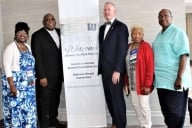You have /5 articles left.
Sign up for a free account or log in.
I read a lot of good education-related books and upon finishing immediately think that I need to write a blog post about it, but then the opportunity slips away when something more timely presents itself. After a while, I’m sitting on a stack of stuff I want to get the word out about and not enough time to write a half dozen or more separate installments.
When the stack gets to tottering heights, I finally admit that I’m not going to write about each book individually and instead convince myself to do a capsule roundup of a bunch of books at once.
That’s what I’m doing here. My apologies to the authors who truly deserve more textual real estate, but perhaps these little bits will induce some folks to check these books out for themselves.
(Note: All links to these books go to my Bookshop.org shop, whose affiliate income goes to Open Books, a Chicago-based nonprofit dedicated to putting books into the hands of young people who otherwise might not have access to them.)
The full list of books can be found here. Click on the individual titles for links to the specific books.
Failure to Disrupt: Why Technology Alone Can’t Transform Education by Justin Reich
Reich, a professor at MIT, is the veritable definition of a straight shooter. Both ed-tech evangelists and skeptics (like me) should be interested in his exploration of how and why technology has failed to live up to the promise of fundamentally upending how we teach. I’d describe Reich as someone who believes in the power of technology as a tool of instruction who is also disappointed in how this potential gets treated at the institutional level. As a skeptic, I wound up warmer to the possibilities of ed tech after reading Reich. I think an evangelist would (hopefully) feel somewhat chastened.
Skim, Dive, Surface: Teaching Digital Reading by Jenae Cohn
I feel like I was well aware that how we encounter, process and manipulate text in the digital realm is fundamentally different than the analog age, but Cohn, director of academic technology at Cal State Sacramento, goes both broad and deep on this phenomenon in a way that will benefit anyone. The first half (or so) of the book is an exploration of reading across different mediums, a simultaneously practical and theoretical underpinning for what comes in part two, which is titled “An Introduction to the Digital Reading Framework,” which situates the activities we engage in when reading (though even this term is fraught) in the digital world. It has lots of practical approaches to use with students. Highly recommended if you’re looking for pedagogical approaches in this realm.
Competition Overdose: How Free Market Mythology Transformed Us From Citizen Kings to Market Servants by Maurice E. Stucke and Ariel Ezrachi
First, this is no screed from them leftist, commie, Marxist, America-hating professors that have overrun our institutions. Law professors Stucke (University of Tennessee) and Ezrachi (Oxford) are dyed-in-the-wool free marketers who revere competition as a mechanism for bringing out optimum results. But this reverence is what spurs them to explore systems where competition is ill suited to desired outcomes. The first chapter is music to my ears, an exploration of the distorting and disastrous effects of the U.S. News college and university rankings.
Super Courses: The Future of Teaching and Learning by Ken Bain
Using a method similar to What the Best College Teachers Do, Bain travels the globe looking for the courses rooted in what we know about effective learning that prove most impactful on students. We learn mostly what a “super course” is like, the atmosphere the instructor sets, the kinds of problems they ask students to solve, the activities the course entails. As with that earlier book, the result isn’t so much a how-to, but a source of inspiration to consider one’s own pedagogy and how it fits in with these practices that have proven successful.
Craft in the Real World: Rethinking Fiction Writing and Workshopping by Matthew Salesses
This is a book I still hope to write about in more detail in the future, but for now, let me just say that I think this is a game-changing look at how the dominant culture shapes notions of aesthetic and artistic quality that are valued and reinforced in our academic creative writing workshops. Clearly and methodically Salesses demolishes the notion that this dominant culture should have any special standing and that our settling for this default is a failure to be open to other possibilities of artistic expression. Salesses puts into words qualms I’ve had since I entered my first workshop as an undergraduate student in 1989. Highly recommended for any teacher of writing, fiction or otherwise.
Ungrading: Why Rating Students Undermines Learning (and What to Do Instead) edited by Susan D. Blum
Full disclosure, I contribute a chapter to this volume, “Wile E. Coyote: The Hero of Ungrading,” but the real value (modesty not aside) is in the contributions of others who give on-point practical advice for anyone who is considering alternative grading systems in their classes. I practically ran out of ink in my pen underlining passages from others.





